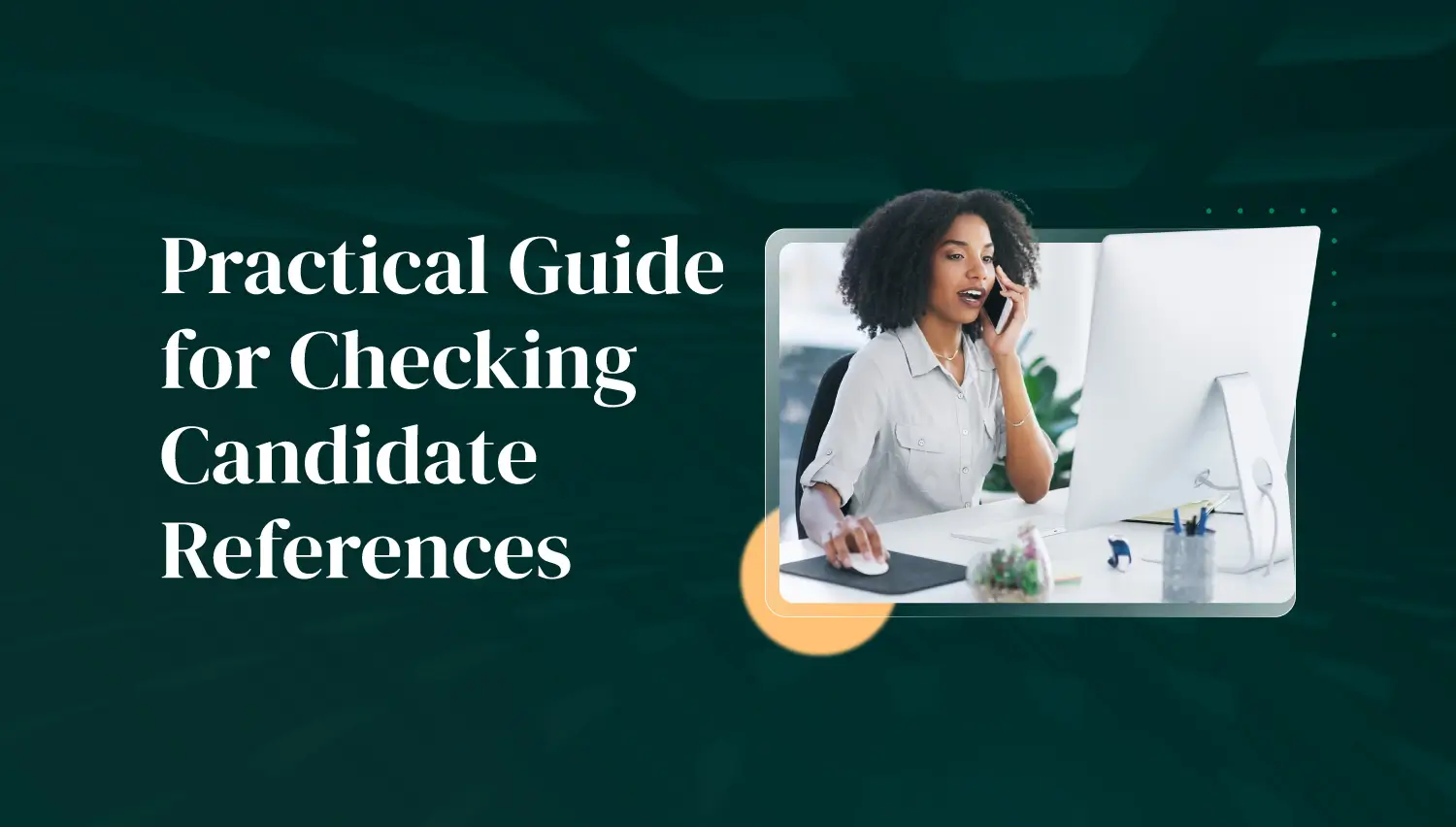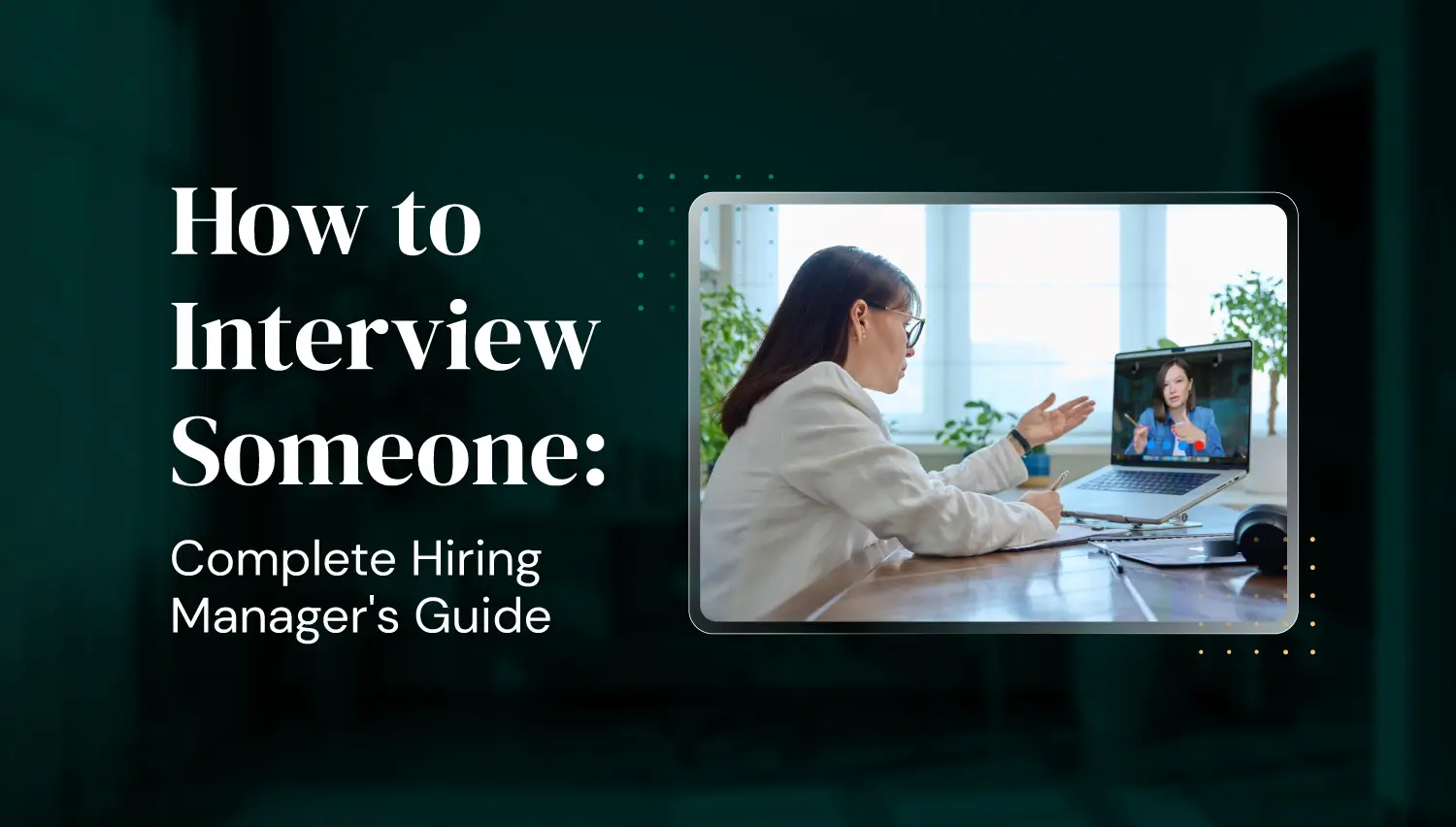Even as a seasoned recruiter, I'm continually reminded how reference checks can uncover the subtleties that interviews and resumes leave hidden.
I once worked on a search for a critical leadership hire. The candidate looked perfect on paper and handled interviews like a pro. During reference calls, I expected glowing reviews and largely got them. But one former colleague, while praising the candidate's strategic skills, also mentioned how their blunt communication style sometimes created tension on high-stakes projects.
It wasn't a deal-breaker, but it changed how we structured the candidates' onboarding and how the hiring manager planned to integrate them into the team. That's the real value of reference checks: they're not just about catching red flags, but surfacing context that helps new hires succeed.
If you're wondering how to check job candidate references effectively and how to get beyond polite platitudes to real, usable insights, this guide will walk you through the process I rely on every time.
Why Reference Checks Matter
I've often said that hiring is equal parts evidence and intuition, and reference checks are where those two intersect. You can trust your instincts all day long, but without external validation, you're flying blind.
Done well, reference checks give you critical advantages:
- Validating candidate information: Candidates naturally put their best foot forward on resumes and in interviews. References help confirm the truth behind the titles, responsibilities, and accomplishments listed on paper. It's not about catching people in lies; it's about ensuring what's been presented matches reality.
- Assessing cultural fit: No one can fully grasp a candidate's work style or interpersonal dynamics just from interviews. References offer a window into how someone collaborates, handles stress, and meshes with different teams. Especially in remote or cross-cultural environments, this insight can save you from costly misalignment later.
- Identifying potential red flags: Occasionally, references will surface candidate red flags that were invisible during interviews, challenges with communication, follow-through, or handling feedback. These aren't always deal-breakers, but they are critical context for deciding how to support and integrate a new hire.
When I'm working with clients, I frame reference checks as insurance. It's the step that protects your company from surprises, helps you avoid expensive misfires, and ultimately increases the odds that your new hire becomes a high performer.
Preparing for Reference Checks: Setting the Stage for a Valuable Conversation
The biggest mistake I've seen even among experienced hiring managers is treating reference checks like a casual chat. To truly make reference calls effective, preparation is non-negotiable. Here's how to set yourself up for success:
1. Obtain Clear Consent
Before you pick up the phone, make sure you have the candidate's written consent to contact their references. This is not only a legal requirement in many jurisdictions but also a matter of professional respect. Good candidates will expect you to handle this discreetly.
2. Choose the Right References
Don't settle for generic references like "a friend from another department." Aim for people who directly supervised the candidate, worked closely alongside them, or interacted with them in relevant professional contexts. The closer the reference was to the candidate's daily work, the more valuable (and accurate) the insights.
3. Prepare a Structured Questionnaire
A reference check isn't the time for improvisation. Draft open-ended, role-specific questions in advance. Instead of asking, "Was the candidate good at their job?" try: "Can you describe a time they handled a challenging project under pressure?" The more specific your questions, the more specific (and useful) the answers.
4. Schedule Enough Time
Don't rush through reference calls between meetings. Block at least 20-30 minutes per reference to allow for follow-up questions and to give the reference time to elaborate. You're aiming for a genuine conversation, not a checklist.
When it comes to how to check job candidate references effectively, this prep work is what separates surface-level confirmations from the deep insights that lead to confident hiring decisions.

Conducting Reference Checks: Turning Polite Chats Into Real Insight
If you've done your prep well, the actual call should feel less like an interrogation and more like a professional conversation. Here's how to check job candidate references in a way that gets real, actionable insights:
Start the Call Professionally
Introduce yourself, explain the purpose of your call, and confirm it's a good time to talk. Even if you have the reference's permission, showing courtesy sets the tone for a candid conversation.
"Hi [Reference's Name], this is [Your Name] calling from [Your Company]. I'm working on a hiring process, and [Candidate's Name] listed you as someone who worked closely with them. I'd love to get your perspective on their experience and working style. Do you have about 20 minutes right now, or is there a better time for us to connect?"
This approach confirms who you are and why you're calling, respects the reference's schedule, and signals that you're looking for thoughtful, in-depth feedback.
A professional introduction like this can immediately build trust and increase the likelihood of getting honest insights rather than polite surface-level responses.
Build Rapport, But Stay Focused
A bit of friendly small talk can help the reference relax. For instance:
"I saw on LinkedIn you're with [Company], are you still handling [Relevant Function]? How's business been this year?"
But keep it brief. You're not there to network; you're gathering insights about the candidate. After a couple of minutes, pivot back to your purpose:
"Thanks for sharing that. Let me dive into some questions about [Candidate's Name]."
This balance makes the conversation feel human, not transactional, while keeping you on track.
Ask Targeted, Open-Ended Questions
Generic questions yield generic answers. The best insights come from thoughtful, specific questions tied to real work scenarios. For example:
- "How would you describe [Candidate's Name]'s approach to managing shifting priorities or tight deadlines?"
- "Can you recall a time when they received constructive feedback? How did they respond?"
- "What type of team environment do you think they thrive in?"
- "What advice would you give their next manager to help them succeed?"
Avoid yes/no questions like "Were they good at their job?" Instead, look for stories and examples that reveal behavior, problem-solving style, and interpersonal dynamics.
Listen for Nuance
References rarely say outright, "Don't hire this person." Instead, concerns often show up subtly, in tone, pauses, or vague phrasing. For example:
- "They're… very independent." (Could signal trouble collaborating.)
- "They were good at getting things done, though sometimes people felt… challenged by their style." (Possible interpersonal issues.)
If you sense hesitance, gently probe further:
"That's helpful. Can you tell me a bit more about what you mean?"
Being attentive to subtext is one of the most valuable skills you can bring to reference checks.
Stay Objective and Respectful
No matter what you hear, stay neutral. Don't offer your own opinions about the candidate or try to coax negative comments. Your role is to collect facts and context, not to steer the narrative.
Instead of leading questions like:
"Did you find them difficult to manage?"
Try neutral phrasing:
"How would you describe their relationship with colleagues and managers?"
Respectful objectivity ensures references feel safe sharing candid feedback, and it protects you legally and ethically.
Analyzing the Feedback: Turning Notes Into Actionable Hiring Decisions
Collecting reference feedback is only half the battle. The real value comes from knowing how to interpret what you've heard and connect it back to your hiring decision. Here's how to make sense of the insights you gather:
Cross-Reference Information
Start by lining up what you heard in reference calls with the candidate's resume and interview answers. Look for consistency:
- Are job titles, dates, and responsibilities aligned across all sources?
- Do the examples shared by the reference match the candidate's own stories?
A minor discrepancy doesn't always mean dishonesty. It could simply be different memories or perspectives. But bigger gaps are worth clarifying with the candidate before proceeding.
Identify Consistent Themes
One lukewarm comment from a reference might not be a deal-breaker. But if multiple people independently mention similar concerns, like difficulties with collaboration or handling feedback, it's a pattern worth paying attention to.
I always ask myself: "Is this a single person's opinion, or a repeated theme that could impact the candidate's success in this specific role and environment?"
Remember, some "negatives" aren't universal flaws. For instance, a direct communication style might be problematic in one workplace but a perfect fit in another.
Document Findings Clearly
Keep thorough notes of your reference conversations. Capture:
- Names, roles, and relationship to the candidate
- Specific examples shared
- Key positive takeaways
- Any concerns or nuances
Avoid recording personal opinions. Stick to factual statements from the reference. Well-organized documentation serves three purposes:
- It helps you defend your hiring decision if challenged.
- It ensures you don't forget important context over time.
- It creates a record you can share (appropriately) with other stakeholders involved in the hiring decision.
Use Feedback to Inform Onboarding
Reference checks shouldn't be treated purely as a screening tool. Smart hiring leaders use the information to tailor onboarding and support.
For example:
- If references mention that a candidate struggles with prioritization under pressure, you can plan additional check-ins during the first months.
- If they rave about the candidate's leadership but mention they sometimes overcommit, you might coach them on managing workload expectations.
This proactive approach helps new hires integrate faster and positions them (and your team) for success.

Navigating Legal and Ethical Considerations: How to Stay Compliant While Digging for Insight
It's tempting to treat reference checks as casual conversations, but remember, you're dealing with personal data and potentially sensitive topics. One slip-up could expose your company to legal risk or damage your reputation. Here's how to check job candidate references while staying firmly on the right side of the law and ethical best practices:
Avoid Discriminatory Questions
Never ask about topics that relate to protected classes, such as age, race, religion, marital status, sexual orientation, disability, or medical conditions. Even indirect questions like "Do they have kids?" or "Are they planning to retire soon?" are off-limits.
Instead, keep questions strictly job-related, focusing on performance, skills, and behavior relevant to the role.
Maintain Confidentiality
Reference information is sensitive. Share it only with individuals directly involved in the hiring decision. Don't casually mention insights from references in broader team discussions.
Example of good practice:
"We've gathered reference feedback indicating areas where the candidate may need extra support during onboarding. Let's discuss how we can plan for that."
Avoid vague gossip like:
"Apparently, they've had issues with coworkers in the past."
Obtain Proper Consent
Always secure the candidate's explicit permission, preferably in writing, before contacting references. This protects you legally and signals respect for the candidate's privacy. It also helps avoid awkward situations where a reference didn't know they'd been listed.
Comply with Data Privacy Laws
Depending on where you or your candidates are located, data privacy laws may apply, including GDPR in Europe, or various U.S. state laws like the California Consumer Privacy Act (CCPA). These regulations often govern:
- What personal data you can collect
- How long you can store it
- How and with whom you can share it
If you're unsure, consult legal counsel or your HR department before proceeding, especially if you're hiring internationally.
Stay Truthful in Your Own References
Remember: one day, someone might call you for a reference. When providing references yourself, stick to factual information and honest opinions based on direct experience. Avoid exaggeration, either positive or negative, to protect both yourself and the candidate.
Make Reference Checks Your Secret Weapon
When I think back to the countless hires I've helped place, one truth stands out: reference checks are often where the real story emerges. They're not about catching candidates in lies; they're about discovering the context that helps you make smarter decisions and set people up for success.
Done right, checking job candidate references can give you insights no resume or interview ever will. It can confirm skills, reveal hidden strengths, and surface potential challenges you'll want to navigate proactively.
So treat reference checks as a strategic tool, not a formality. Prepare thoughtfully, ask the right questions, listen deeply, and analyze what you learn. And if your hiring goals stretch across borders, or if you're scaling fast, don't hesitate to bring in experts who know how to manage the process with precision.
Partnering for Global Hiring Confidence
For many roles, running reference checks internally is entirely doable, especially when you're hiring locally or filling just a few positions. But as your business grows, so do the stakes and the complexities involved.
High-volume hiring can stretch your team thin. International searches introduce legal and cultural differences that make even a simple reference call more challenging. And for senior leadership hires, the insight you gain (or fail to gain) can have a lasting impact on your organization.
That's where a partner like Somewhere comes in. We specialize in helping companies build worldwide teams, with the expertise to navigate global compliance, cultural nuances, and the delicate conversations that reference checks often require.
If you're looking to elevate how you check job candidate references (especially for international or high-stakes roles), consider connecting with our team. We can help you turn reference checks into a strategic advantage rather than a simple checkbox.











.webp)


